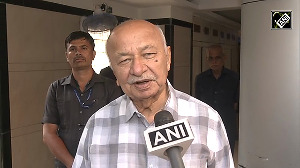The Bharatiya Janata Party is counting on women voters and the caste calculus, among others, to swing the crucial polls in its favour. Archis Mohan reports.

Bharatiya Janata Party president Amit Shah said at a rally in Patna on Monday that the National Democratic Alliance would win a majority of the seats that went to polls in the first two phases earlier this month in Bihar. Shah claimed the party would win 28 to 32 of the 49 seats from Phase-I, and 20 to 24 of the 32 seats voted for in Phase-II.
Complete Coverage: The Battle for Bihar
Senior BJP leaders are convinced that its alliance will surprise naysayers, just like the party did with its performance in Uttar Pradesh in the Lok Sabha elections, and then in Maharashtra, Jharkhand and Haryana Assembly polls.
Indeed, they insist the party will turn in an equally splendid performance in the remaining three phases of voting in Bihar.
So, what explains the BJP’s confidence? Here are six reasons why the party is so gung-ho about its performance:
1. Cadre and resources: The BJP claims to have over 600,000 workers, 10 workers each for the more than 60,000 polling booths. The five-phased polling also gives it the advantage of re-deploying these workers from areas where polling is over.
Its membership drive had notched up 9.6 million members in Bihar -- a seventh of Bihar's 68 million electorate. Add to this an estimated 70,000 Rashtriya Swayamsevak Sangh workers from across the country and enormous resources at the command of the alliance. This cadre strength is helping the BJP not only mobilise its voters more efficiently on polling days but more effectively spread its message to the remotest of villages.
In contrast, the Grand Alliance is a rag-tag coalition with little synergy. Even Janata Dal (United) and Rashtriya Janata Dal insiders speak of workers that are liable to switch loyalties for reasons other than political commitment.
2. Haryana model and anti-Lalu vote: The BJP believes its 'jungle raj' campaign has struck a chord. Only the Muslims, Yadavs and Kurmis, who account for 35 per cent, are with the 'Grand Alliance' while the remaining 65 per cent will vote for BJP-led alliance, it believes.
The BJP calls this its ‘Haryana model’, where it had succeeded in consolidating all other castes against the dominant Jats in the 2014 Assembly polls.
3. Perfect patchwork of caste alliances: BJP strategists think they have stitched together a perfect alliance of castes, with the 15 per cent upper castes supporting the BJP, eight per cent Kushwahas behind their leader -- Rashtriya Loktantrik Samata Party’s Upendra Kushwaha -- the evenly distributed five per cent Paswans with Ram Vilas Paswan and rest of the 10 to 11 per cent Mahadalits with former Bihar chief minister Jitan Ram Manjhi. It also estimates that the majority of the 30 per cent Extremely Backward Castes, comprising 114 castes, will also support its alliance.
4. Narendra Modi: The prime minister’s popularity is still undiminished. The large crowds that have turned up at his dozen election rallies are evidence of this.
The BJP estimates the 'Modi effect' will help it increase its vote share in Bihar from the 38.5 per cent that its alliance received in the 2014 multi-polar Lok Sabha contest.
The BJP needs a vote share of at least 43 to 44 per cent to win Bihar in what is now essentially a two-horse race. It hopes to beat the trend of failing to match its vote share of the 2014 Lok Sabha polls in subsequent state elections in Haryana, Jharkhand, Maharashtra, Jammu and Kashmir, and Delhi.
Incidentally, its only defeat -- drubbing, in fact -- since 2014 came where its main rival was a credible non-Congress party: In Delhi against the Aam Aadmi Party in February.
5. Women voters: The high turnout of women in the first two phases is thought to be a vote for Modi’s promise of security and development.
6. Beef: The BJP thinks it has Rashtriya Janata Dal chief Lalu Prasad on the run for his remarks about eating beef, forcing the former Bihar chief minister to clarify them at each of his rallies. This, it believes, has also neutralised whatever damage the party suffered because of Rashtriya Swayamsevak Sangh chief Mohan Bhagwat’s remarks on reviewing the caste-based reservation policy.
There is hope the Left parties and Third Front alliance that the Samajwadi Party leads will eat into the votes of the Grand Alliance. The BJP has a well-oiled team of strategists that have undertaken a course correction after realising the 'Bihar versus Bahari (or outsider)' campaign of its rivals could be getting traction because it over-projected Modi and Shah.
It has now put up more hoardings of its local leaders like Sushil Modi, Rajiv Pratap Rudy, Nand Kishore Yadav, Ravi Shankar Prasad, and others.
REDIFF RECOMMENDS: THE I AM BIHAR SERIES







 © 2025
© 2025